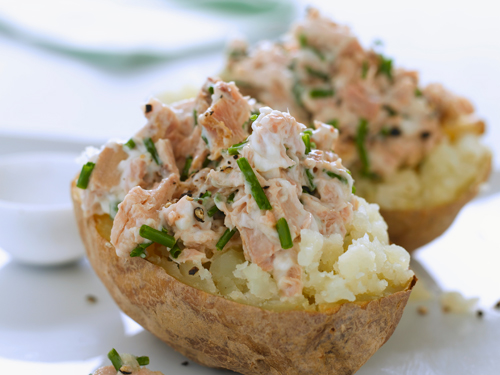With over 160 different varieties, the potato has become a common staple of the western and Eastern European Diet, and it can be prepared many different ways. The potato originated in Peru, but now it is grown all across the world and is common in home gardens. Although sometimes avoided due to the high carbohydrate content, a baked potato is a relatively low-calorie and nutritious food, high in several vitamins and minerals.
Potatoes are part of the nightshade family, which also includes tomatoes, eggplant and peppers. They have been grown in South America for some 4,000 to 7,000 years.
As the “World’s Healthiest Foods puts it, potatoes are an “exceptionally healthful, low calorie, high fiber food that offers significant protection against cardiovascular disease and cancer.”
Baked, steamed or properly sauteed–but not fried–wild and commercial potatoes offer 60 different phytochemicals and vitamins in their flesh and skin.
Health Benefits from Potatoes
In addition to vitamins and minerals, potatoes, and particularly potato skins, are an excellent source of dietary fiber, which helps protect against heart disease and perhaps some forms of cancer. Last, but not least, potatoes are good for dieters. As a food with complex carbohydrates, potatoes make you feel fuller for a longer time. Potatoes also are a low calorie food. One new potato, for example, contains only 26 calories.
Dietary Fiber
Baked potatoes are high in carbohydrates, but they are a good source of dietary fiber. A large potato contains nearly 7 g of fiber. Dietary fiber is the indigestible portion of a plant that is an essential component of a healthy diet and digestive system. It helps maintain normal bowel movements, controls blood sugar levels, lowers cholesterol and may help aid in weight loss. The Institute of Medicine recommends adults consume 25 to 38 g of fiber per day.

Top 5 Potato Tips For Sports Nutrition (From http://www.potato.ie )
1. Watch your Carbohydrate Intake
For an athlete the main source of fuel or energy for the working body is carbohydrate. As activity increases the amount of carbohydrate required also increases. The GAA recommend eating enough carbohydrate to fuel all types of exercies. Too little will result in fatigue, lack of energy, muscle loss and your training will suffer. Even more important than the amount consumed is the type of carbohydrate consumed.
2. Fill up on High Fibre Foods
High Fibre foods will help you fill up and feel satisfied for longer keeping hunger at bay. The GAA have recommended potatoes a list of high fibre foods you should base your meals on. The combination of Vitamin C and Fibre in potatoes provide an athlete with a good all-round source of nutrition. They also contain virtually no fat. The fibre content of potatoes helps to ensure the digestive system does not cause any upset during periods of high intensity competition, as can be associated with many sports.
3. Watch your Iron Intake
According to the Irish Sports Council, athletes undertaking training require higher amounts of Iron than sedentary people and females have higher requirements than males. Iron requirements of athletes are higher than those who do not undertake exercise. This is because heavy exercise increases the use of Iron in the body and also increases loss of Iron in the body. Potatoes can be included in the diet to provide an excellent source of Iron, and provide more than any other vegetable. Did you know that 1 Baked Potato provides more iron than a portion of roast beef or tinned sardines?
4. Stock up on Low Fat Snacks
The body of an athlete needs a certain amount of good fats to function. However when consuming fuel for energy the preference is for low or no bad fat. Potatoes on their own are a low fat source of carbohydrate and so can form a large part of an athletes diet.
5. Vitamin C
Potatoes contain large amounts of Vitamin C. This is commonly known as the vitamin that protects our immune system from colds and flu. It is not stored in the body and therefore must be consumed every day. Athletes, due to the extra stress on the body are more at risk of cold and flu particularly in our Irish climate

















